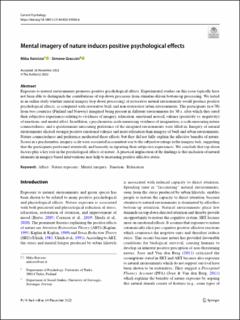| dc.contributor.author | Koivisto, Mika | |
| dc.contributor.author | Grassini, Simone | |
| dc.date.accessioned | 2023-04-17T12:17:54Z | |
| dc.date.available | 2023-04-17T12:17:54Z | |
| dc.date.created | 2022-12-07T17:37:22Z | |
| dc.date.issued | 2022 | |
| dc.identifier.citation | Koivisto, M., & Grassini, S. (2022). Mental imagery of nature induces positive psychological effects. Current Psychology, 1-16. | en_US |
| dc.identifier.issn | 1046-1310 | |
| dc.identifier.uri | https://hdl.handle.net/11250/3063363 | |
| dc.description.abstract | Exposure to natural environments promotes positive psychological effects. Experimental studies on this issue typically have not been able to distinguish the contributions of top-down processes from stimulus-driven bottom-up processing. We tested in an online study whether mental imagery (top-down processing) of restorative natural environments would produce positive psychological effects, as compared with restorative built and non-restorative urban environments. The participants (n = 70) from two countries (Finland and Norway) imagined being present in different environments for 30 s, after which they rated their subjective experiences relating to vividness of imagery, relaxation, emotional arousal, valence (positivity vs. negativity) of emotions, and mental effort. In addition, a psychometric scale measuring vividness of imagination, a scale measuring nature connectedness, and a questionnaire measuring preference of the imagined environments were filled-in. Imagery of natural environments elicited stronger positive emotional valence and more relaxation than imagery of built and urban environments. Nature connectedness and preference moderated these effects, but they did not fully explain the affective benefits of nature. Scores in a psychometric imagery scale were associated in consistent way to the subjective ratings in the imagery task, suggesting that the participants performed attentively and honestly in reporting their subjective experiences. We conclude that top-down factors play a key role in the psychological effects of nature. A practical implication of the findings is that inclusion of natural elements in imagery-based interventions may help to increasing positive affective states. | en_US |
| dc.language.iso | eng | en_US |
| dc.publisher | Springer | en_US |
| dc.rights | Navngivelse 4.0 Internasjonal | * |
| dc.rights.uri | http://creativecommons.org/licenses/by/4.0/deed.no | * |
| dc.title | Mental imagery of nature induces positive psychological effects. | en_US |
| dc.type | Peer reviewed | en_US |
| dc.type | Journal article | en_US |
| dc.description.version | publishedVersion | en_US |
| dc.rights.holder | The authors | en_US |
| dc.subject.nsi | VDP::Samfunnsvitenskap: 200::Psykologi: 260 | en_US |
| dc.source.journal | Current Psychology | en_US |
| dc.identifier.doi | 10.1007/s12144-022-04088-6 | |
| dc.identifier.cristin | 2090328 | |
| cristin.ispublished | true | |
| cristin.fulltext | original | |
| cristin.qualitycode | 1 | |

